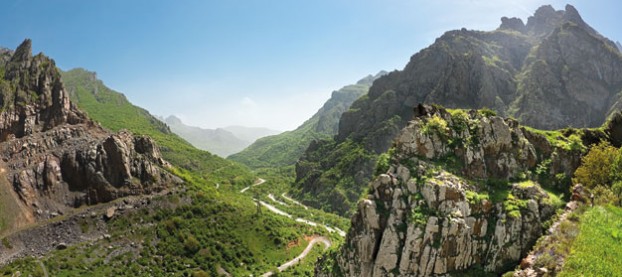
The Land of David.
Somewhere in the distance rustled with outright disturbed night thunder-storm of Vorotan, the river in itself capricious and, to local measures, large. Even inflows of Vorotan — kids of Gehi and Vohcha proceeding on Kapan, — have solved, in imitation the parent, to inflate for importance of a cheek and to play in elements. Windows of our hotel accommodations look directly at Vohch — while we drink morning coffee, it with enthusiasm throwing between foaming the stuff which has been washed off in it by a downpour. But children are easily appeased — affected ferocity was quickly replaced by usual fun, and toys have soon ended, and Vohcha has accepted usual, cheerful and a bit tousled, a kind.
Yesterday we have returned from village David-bek, nearby to Kapan where us met and accompanied on the UAZ unforgettable Erazahan. Today, our path lay in the village, too, David-bek, too far from Kapan, just the other way on the road to the industrial Kajaran.Perhaps, we wondered this purpose would have found here a couple sat down with the same name – the legendary military commander’s nice to war in this region three centuries ago.
Having consulted the map, we went towards Kadzharan. It was necessary to reach to the well-known figure of the bear settled down on the brink of the rock and keeping in a mouth symbolical keys from Kapan — there and there is next David-bek. We, however, passed a bear long ago and already began to worry, without having found the index with such name. It was necessary to ask the road the uncle on the small vehicle harnessed by a graceful burro with improbably beautiful eyes. It appeared, we left the village far behind — our card a little obsolete, the village renamed, and now one settlement by name of David-bek became less, but Andokavan increased. The village is – roadside and all the main structures, namely a shop, school and cafe, located right on the highway. In school we learned to deal with learning the Russian language is well supplied, otherwise how to explain the large amount of graffiti on the great and mighty on the walls – without a single grammatical error and it is, incidentally, is decent.
We went into a cafe to fill their anxieties about the elusive David-Bek something refreshing, and at the same time to find out how to get to the castle here. The host institution, which occupied the enclosed porch of his house, pointed up – say, over there on top of a cliff, hanging over Andokavan, and expensive, and offered to escort us to detach from, as he put it, the local bums.
Frankly, in anticipation we’ve been slacker unworthy thoughts on the subject of what makes a clever when a mountain – too steep and rocky, it seemed to bottom. But defeatism was swept away with indignation. And just then arrived, and a high man, though silent and turned out to be weird, but nonetheless perfectly knowing where it is more convenient and safer to climb to the Bagaberd – so called this fortress.
Places of Military Glory
Climbing – is not my sport, and had pretty sweat, before reaching Bagaberd. Best of all felt our photographer, a seasoned and well-worn hiking in the mountains and abruptly. The path to the castle itself is not difficult, just a circuitous and sometimes treacherous – in some places the road is dotted with small stones, that and strive to slip out from under their feet. But all difficulties behind, and the fortress of David-Bek in front of us.
A rock, sheltered Bagaberd, stands almost directly above the confluence of Gekhi and Vokhchi at an altitude of about 200 meters above the river. Remains a contentious issue date of the foundation of the fortress. Some historians date it III-IV centuries. Thus, the historian Stephanos Orbelian suggested that the 350 year castle already existed and that it was the Armenian king Arshak II in military operations against the Persians. According to legend, in the IV century, the army of the Shah of Iran Shapur II, who tried to break in Syunik, could not take it. In other versions, the old Fortress was built by the princes of Syunik in the V century.
The defensive strength of the fortress with the passage of time has steadily increased, and due to its advantageous location on the ground, it was considered impregnable. On three sides it really possible to take except that with aircraft: a rock is dropped into the gorge, and the approach to it is open only to the side on which we climbed. It is clear that this path is constantly guarded, and judging by the location of walls, well-sweep, and could well be (and probably grew more than once) a trap for the invaders.
Today the preserved part of the inner and outer walls of the fortress, the fragments of the watch-towers, and careful researcher could track the underground secret passages, which were used by the defenders Bagaberd for a long siege.
Bagaberd became the capital of Syunik kingdom at the beginning of XII century. Being inaccessible for at least six centuries, the fortress, however, could not resist the invasion of the Seljuks, who carried death and destruction – as always, by the way. In 1170 everything was looted, tens of thousands of manuscripts, taking to Bagaberd the fort from all of Syunik, irrevocably destroyed – a humanitarian disaster, as one would say today.
All the time we spent in research Bagaberd in raptures over the beauty of Syunik, our escort melancholy sat on the edge of the cliff, throwing stones into the abyss of the gorge. After three hours we had to tear him away from such fascinating activities – it was time to go down to the village. Soon we were again in the diner – very much like to drink a cup of coffee has become a necessity. For simplicity, we decided to treat mental and stone thrower, but his face reflected in disgust, and the master laughed so significantly that instant coffee has been replaced by a bottle of beer. This is where we first heard them uttered a word:
– Thank you! – He said with feeling, beaming face, and suddenly added: – Actually, in our local castles, as the rain drops.
While we enjoyed the coffee brewed on the coals, the owner told the legend that if David-Bek, in the siege of Bagaberdeescaped captivity, along with his army by cable car, which the defenders of the woven leather straps and threw the other side of the gorge . It’s a Fairy Tale.
Environmentally friendly hermit
After resting, we decided to drive a little deeper on the slopes along the river Gekhi – noticed the road and sat down when standing on a cliff top. We drove, in truth, not knowing what to see, but ultimately did not regret about it.
First, on this road to enter the Adzhibadzh – a picturesque village on the banks of the river. Here, however, there are no landmarks, except for a dilapidated churches unknown time of construction, but the stunning views. The church once a surprise, when we examined it, out of the ground from under the manhole wall inconspicuous rose suddenly middle-aged man. His appearance was so unexpected that we took was for him astray in time of the saint. It turned out, it’s just Ararat, owner of the house, which stands just above the church.As it turned out, it is a tunnel that ends in the middle of the garden of Ararat. That the inhabitants of the house and cut his way to church, because if we use the usual way, from the gate, you have to make a detour of thirty meters – too lazy now!
As usual, for we had been shown a keen interest, especially interested in photographic equipment. Humans, like all Syunik, is friendly. We talked – how to live, what they do. The villagers were quick to complain about: Copper-Molybdenum Combine in Kajaran supposedly merges from time to time, something the river, causing residents Adzhibadzha go with a headache. We felt sorry for, but a riot of green gardens and a wealth of villagers by no means suggests the poisoned water – pour something out of the river, where else! Later, we dine and vegetables on molybdenum watering – it was delicious, not poisoned, as if someone had a headache and then vegetables here were clearly innocent.
Soon someone want going the road, and we were invited to ride – it turned out, relatively close to the abandoned village of Kirs, and live near her old man and old woman. Some of them for many miles around. We became interesting to see the hermit, and we certainly agree.
We were invited to ride elderly relatives – their sons live in Kapan and bump once a week, on weekends, to visit their parents. Today I had to take several old piglets – for fattening on pasture. Piglets in bags – just head out – stuffed in the trunk of the “Volga”. They tried to escape and screamed so much that could be heard in Kapan. One beast contrived to bite the finger of his tormentor – judging by instantly changing the vocabulary of the victim, was a painful bite.
Here, finally, the pigs settle into place, everyone was seated, and we followed the “Volga” with yelling boot. The road to Kirs and further, to the hermits, here dirt, and sometimes none at all. The trip took so much more calculation time, especially because of the way we stopped to drink water from a spring with the cleanest, the coldest and tasty water. We passed through the non-residential Kirs and soon stopped at the gate of the elderly.
They were not quite so old, and quite strong people who fundamentally do not want to leave your home. Even despite the fact that here for many years there is no electricity – power poles dismantled, arguing that because two people have several kilometers of the line economically feasible. So they live here a hundred years ago, no amenities, no electricity and gas, keep cattle and cultivate the land. But all their products are environmentally perfect – except dung, no they do not use fertilizer, and cattle graze on the meadows of the cleanest. No, we did find one difference from the way of a century ago – they have a cell phone. You never know what can happen, you can call right away. It seems that the only benefit of civilization, which make these amazing people.
They seem genuinely happy, husband and wife, they know what will live and what to do tomorrow morning – a spate of cases-. We did not resist the question: Is it not terrible? And who are afraid of the answer, all around her. Yes, but if,need urgent medical care – mobile cell phone, but until you reach an ambulance here, because you can die. The owner smiled in his beard: “It is in your cities, you can die, but do not die here. Here goes. “
By Ruben Gyulmisaryan


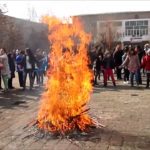
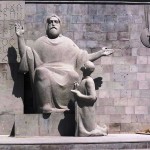

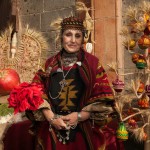

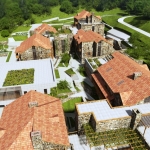

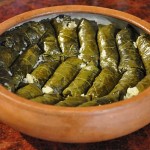

From our photo the scenery in the country is stunning, Afscinating history, but also sadness.